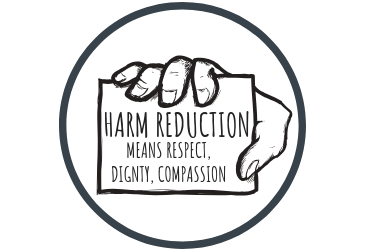What is harm reduction?
Harm reduction-based services involve practical strategies to reduce or mitigate the negative consequences associated with drug use and other criminalized and stigmatized behaviors, which can affect access to healthcare and the quality of care received.
Harm reduction programs engage people at different stages of drug use—people who use drugs; people with substance use disorders; people seeking treatment, including medication-assisted treatment like methadone and buprenorphine; and people in recovery, including abstinence-based recovery. Programs to help people care for themselves and their communities through safer behaviors, relationship-building, and connections to care. Harm reduction-based health services include syringe exchange, community naloxone distribution, overdose prevention, and safer use education, drug-checking services, and low-barrier access to treatment.
Harm reduction is also a philosophy built on a belief in, and respect for, the humanity of people who use drugs. When compassionate and supportive services seek to foster participants’ sense of dignity and self-determination, the effects can be transformative.
To learn more, visit the NC Harm Reduction Coalition.

